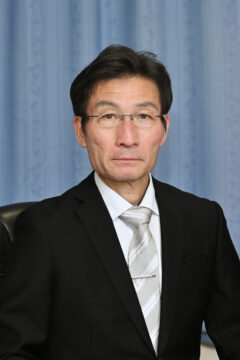Principal : Naoshi Aoyama

My name is Naoshi Aoyama, and I have been appointed as the principal of Oizumi Elementary School affiliated with Tokyo Gakugei University from April 1, 2025. I have served as the principal of three public elementary schools in the Tokyo area for a total of twelve years. Until this March, I was the principal of Shakunagei Nishi Elementary School in Nerima Ward. I intend to fully utilize everything I have cultivated as an educational administrator to contribute to the further development of our school. Since I will be working full-time at Oizumi Elementary, I hope to build a deeper relationship of trust with the children, their parents, and the faculty and staff. Thank you very much for your support.
The history of Oizumi Elementary School attached to Tokyo Gakugei University begins in 1938 when it opened as an elementary school attached to Tokyo Prefecture Oizumi Normal School. Our school has been conducting research since 1966 as a joint school for UNESCO’s “Education for International Understanding and Cooperation,” and in 1969, we opened a class for returning children. Currently, children who have come to Japan or returned from overseas are having fun learning in an international class called “Yuri-gumi” in each grade from 3rd to 6th grade. In this way, for half a century, our school has been an elementary school specializing in international education. Going forward, we will further enrich the environment in which children in international classes and general classes can stimulate each other and collaborate, and expand learning opportunities where they can understand different cultures around the world, so that they can play an active role in the global society in the future. We aim to educate children. We also believe that our school’s mission is to promote education and practical research activities in cooperation with local schools.
In addition, as an elementary school responsible for public education, our school focuses on subject learning, comprehensive learning, English activities, and emotional learning (morality), and from 2001 to 2001, it was designated as a research and development school by the Ministry of Education. We have been disseminating about 10 years of practical research activities and their results. Today, based on the results of those studies, we continue to study every day with the goal of nurturing healthy children who can think for themselves and work tenaciously. In addition, for the four years from 2017 to 2021, as a research and development school designated by the Ministry of Education, Culture, Sports, Science and Technology, we have been deepening our consideration of educational methods that enhance inquiry skills. At the same time, I am in charge of teaching practice, which is the mission of a university affiliated school for teacher training, and by linking the educational theory that trainees have learned at university with the actual teaching practice in the field in front of children, I will be responsible for the next generation. I am involved in the development of educators.
Our school also emphasizes experiential learning where children can touch real objects. One example of this is our chrysanthemum-growing activity, where each child grows one pot of chrysanthemums starting in the spring. Every fall, the school is decorated with chrysanthemums that the children have worked hard to grow. With this chrysanthemum flower as a symbol, the school building is called Kiku-no-sono” and the children are called Kiku-no-ko.” Every November, a Kiku Festival” is held to enjoy the chrysanthemums that each other has grown. We deepen our bonds with each other by cooking and tasting the vegetables we have grown together. Furthermore, we strive to create an environment in which all students can learn from each other and naturally develop an attitude of helping each other through interaction between students of different grades through vertically divided groups called Seikatsudan.” In addition, there are many other experiential learning activities that are part of our school’s tradition, such as Japanese music parties to welcome new first-year students, waterfront school activities such as long-distance swimming, sports days, school-wide excursions, exhibitions, and concerts. Through our activities, we hope to foster healthy, cooperative children.